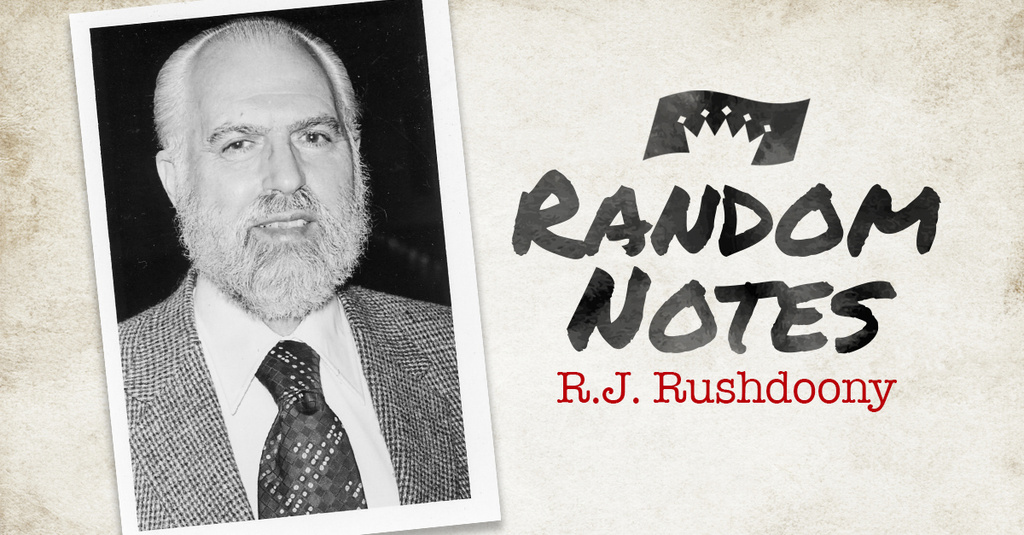
Random Notes, #85
Yesterday, Mark got a new book, which I promptly borrowed, John McCabe's "Laurel and Hardy" (1975,1996).

- R. J. Rushdoony
- Yesterday, Mark got a new book, which I promptly borrowed, John McCabe's "Laurel and Hardy" (1975, 1996). It is hard at this late date to appreciate how much Laurel and Hardy meant to people during the depression years. Economically, times were very hard. I remember my cousins and I picking Malaga grapes for my uncle in the early 1930s. Ten years earlier, they sold at $100 a ton, fresh; now only the winery would buy them, at $1 a ton. For most, it was a time of shattered economic hopes.
Laurel and Hardy's humor touched a very responsive chord. They poked fun at themselves, their hopes, and their unrealistic dreams, and audiences laughed at themselves when they laughed at Laurel and Hardy. I remember farmers who rarely attended a movie, i.e., once in a few years, who saw Laurel and Hardy films with delight.
Humor has changed since then. It has become ugly; it means putting down others, often viciously. Don Rickles is clear evidence of this. The kindly innocence of Laurel and Hardy's humor does not command our time.
I missed most of the Laurel and Hardy films, but I recall with pleasure those I saw.
- I am sorry to see in recent years the decline in dining, which has been replaced by eating. It was once common for breakfast, lunch, or at least dinner to be marked by Bible reading and prayer, and, at times, a discussion of the text and of a Christian and world and life view. In some cases, a particular Bible was always near the table for these. In some families, the children were asked at times to do the reading: they might then be quizzed on the meaning of the text (to prevent daydreaming during the reading).
We think of bull-fighting as a part of the Hispanic world, but about 50 miles from here, in the valley, at Escalon, there is a bull ring, which is legal if the bull is not hurt or killed. It is a game of skill, of taunting a bull without getting hurt or killed, but the bull cannot be hurt without breaking the law. It is not illegal if the matador is injured! He risks death each time. We are more protective of the bull than of the matador!
When we began the Chalcedon Report, we were resolved that it would be theological, Biblical, and concerned with serious subjects. We deliberately excluded reports on church meetings, men's and women's groups, births, deaths, etc. Lately, minor exceptions have occurred, but our basic premise remains the same.
One of the saddest things of our day is the decline in daily Bible reading. Nothing contributes more to our strength than the knowledge of God's Word.
At 83, I think much of the past and of the future, of the changes and challenges of the years. I began life in a rural, horse-and-buggy context. In my early grades, there was always a boy with a broken arm, either from a horse kicking when being harnessed, or from a crank on the Model T Ford kicking when trying to start the car. This reminds me of the difference between boys now and then. In high school, one classmate had run the family farm since age ten and his father's death. Another not only did the same but put his three younger brothers through school before going to the university to become a dentist.
When I reached the fourth grade, we moved to Detroit, Michigan, where my father took a pastorate. It was a very strange world. The most frequent question asked of me in school was whether or not in California we had ever suffered an Indian attack!
I was about five when my cousin Ed and I first went fishing in the Kings River. How many parents would allow a five-year old to fish in a river without supervision? We were then far older at five and seven than boys are now. Maturity then came much earlier than now. In an urban context, I became more a child than I had been on the farm.
Now maturity is deferred even by older and married people, because perpetual youth seems to be the goal. Too many adults lack only diapers to match their childishness. Early in the 1970s, I wrote of the absurdity of a woman in her early 80s wearing a bikini, and I was strongly rebuked by several readers. In the late 70s, I referred again to that incident and received a rebuke from a man of some note! He held that it was both a virtue and a right to try to remain young.

- R. J. Rushdoony
Rev. R.J. Rushdoony (1916–2001), was a leading theologian, church/state expert, and author of numerous works on the application of Biblical law to society. He started the Chalcedon Foundation in 1965. His Institutes of Biblical Law (1973) began the contemporary theonomy movement which posits the validity of Biblical law as God’s standard of obedience for all. He therefore saw God’s law as the basis of the modern Christian response to the cultural decline, one he attributed to the church’s false view of God’s law being opposed to His grace. This broad Christian response he described as “Christian Reconstruction.” He is credited with igniting the modern Christian school and homeschooling movements in the mid to late 20th century. He also traveled extensively lecturing and serving as an expert witness in numerous court cases regarding religious liberty. Many ministry and educational efforts that continue today, took their philosophical and Biblical roots from his lectures and books.